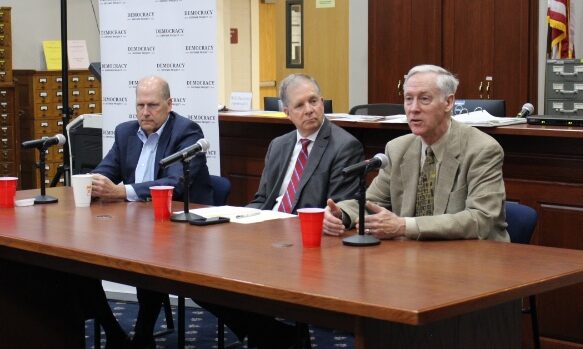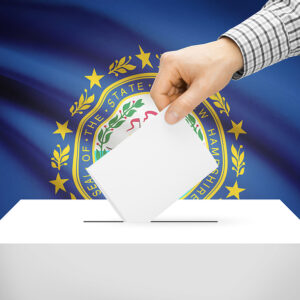At a forum to promote confidence in New Hampshire’s elections, one local election official said it’s time for New Hampshire to show more trust in the people — by ending the requirement to prove you are a citizen in order to vote.
“We talk a lot about voter confidence and building trust in the election system, but what I’m seeing more and more of is the government’s lack of trust in the voter,” said Linda Callaway, town moderator for New Durham, N.H.
“The (law) about a married woman needing to bring a marriage certificate to show that they’re still the person they are? I’m sorry, that is not showing trust.”
Callaway made her comments during an informal discussion with local, elected moderators and the New Hampshire Democracy Defense Project, which is co-chaired by former U.S. Sen. John E. Sununu and former Ambassador Dick Swett.

John E. Sununu, Secretary of State David Scanlan and Dick Swett speak at an event promoting confidence in America’s democracy in Concord, N.H. on June 2, 2025.
Callaway was referencing a new law that requires people to prove they are U.S. citizens when they register to vote in New Hampshire. The state has also ended the practice of affidavit ballots, which allow people without proof of identity and/or residency to sign an affidavit and vote anyway. They were then required to submit proof of identity to the secretary of state within seven days of the election, after their vote had already been counted and mixed in with the rest of the ballots.
Republicans say requiring proof of citizenship in order to become a registered voter is a basic ballot protection, and the affidavit ballot system was both rarely used and never made sense.
Swett, a Democrat who once represented New Hampshire in Congress, didn’t address the proof of citizenship issue specifically, but he said it was important that “voters are confident that the people who cast their votes are eligible to vote.”
The crisis of confidence in government, which includes the election process, is very real, Swett told NHJournal.
“I don’t think the political parties realize how much damage has been done to the public’s view of government,” Swett said. “And I would encourage them to take special notice, and do everything in their power that they can to bring people back, not only to supporting their party, but to supporting their country.”
Sununu argued that one reason New Hampshire hasn’t suffered the collapse of confidence some other states have is because it continues to embrace paper ballots — a technology voters trust.
“I’d like to say that 20 years ago, when a lot of people were moving away from paper ballots in New Hampshire, our congressional delegation at the time was stalwart in saying, ‘No, that’s a bad idea.’ There’s no reason to move away from paper, because paper gives people confidence in elections,” Sununu said. “And we’ve been proven right.”
Sununu even went out of his way to remind Secretary of State Scanlan that, “We don’t have voting machines. We have vote-counting machines. There’s still always a piece of paper.”
All four members of New Hampshire’s federal delegation voted against the SAVE Act, which requires documentation proving citizenship in order to participate in federal elections. And State House Democrats overwhelmingly opposed proof of citizenship at the state level. So, how does a state maintain confidence in its voter rolls if people can register to vote without proving they’re American citizens?
“If we don’t trust them to sign an affidavit (attesting they are citizens) and saying ‘it’s perjury,’ and we can go after them — what is the difference between a piece of paper?” Callaway asked.
“We don’t trust our voters.”
But Sununu said the way to build trust is to do things that make sense. For example, more states should do what New Hampshire does and “count their ballots in a timely way.”
“As Americans, we can all agree that taking three to four weeks — or even two to three months — to count the votes, that’s just not acceptable. It undermines voters’ confidence because it violates their common sense. ‘Why would that be?’ And that leads to conspiracy theories.”
Sununu said other states can learn a lot from New Hampshire’s elections and high turnout. Asked what lessons he’s learned from other states that New Hampshire should follow, something other states might do better, Sununu was stumped.
“I honestly can’t think of any.”





